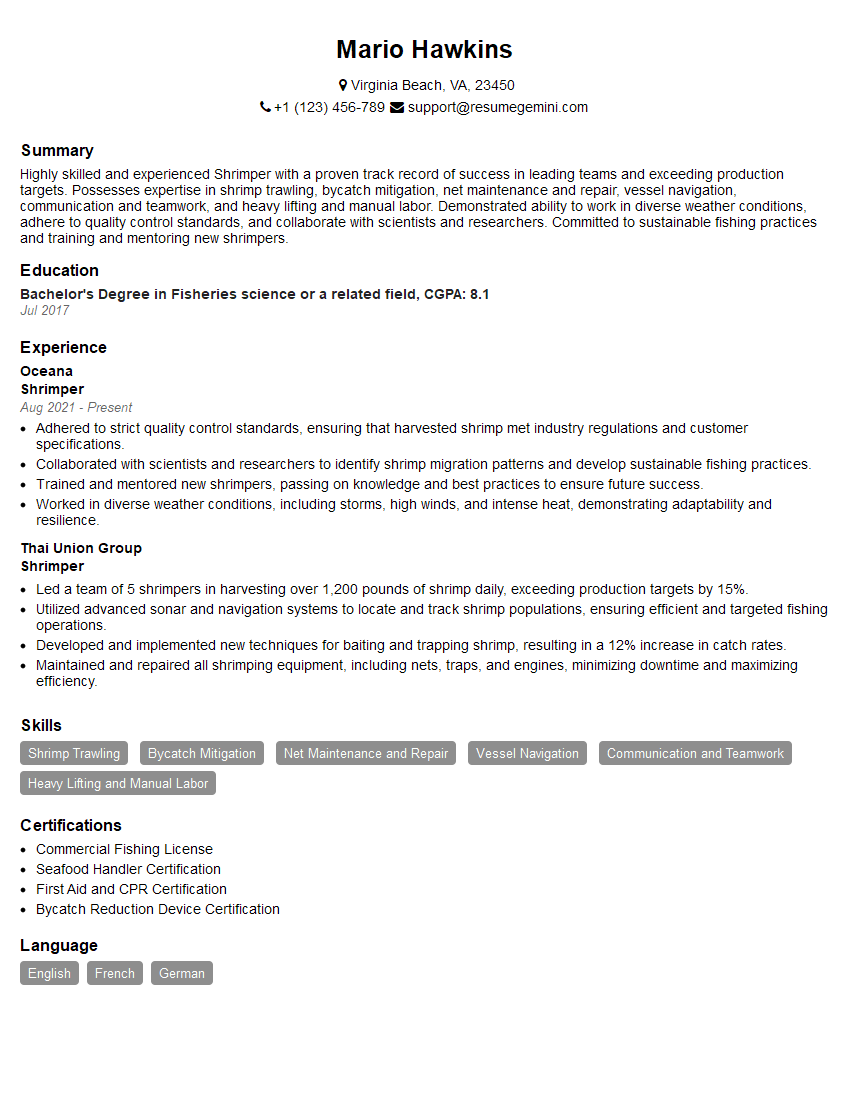Are you a seasoned Shrimper seeking a new career path? Discover our professionally built Shrimper Resume Template. This time-saving tool provides a solid foundation for your job search. Simply click “Edit Resume” to customize it with your unique experiences and achievements. Customize fonts and colors to match your personal style and increase your chances of landing your dream job. Explore more Resume Templates for additional options.

Mario Hawkins
Shrimper
Summary
Highly skilled and experienced Shrimper with a proven track record of success in leading teams and exceeding production targets. Possesses expertise in shrimp trawling, bycatch mitigation, net maintenance and repair, vessel navigation, communication and teamwork, and heavy lifting and manual labor. Demonstrated ability to work in diverse weather conditions, adhere to quality control standards, and collaborate with scientists and researchers. Committed to sustainable fishing practices and training and mentoring new shrimpers.
Education
Bachelor’s Degree in Fisheries science or a related field
July 2017
Skills
- Shrimp Trawling
- Bycatch Mitigation
- Net Maintenance and Repair
- Vessel Navigation
- Communication and Teamwork
- Heavy Lifting and Manual Labor
Work Experience
Shrimper
- Adhered to strict quality control standards, ensuring that harvested shrimp met industry regulations and customer specifications.
- Collaborated with scientists and researchers to identify shrimp migration patterns and develop sustainable fishing practices.
- Trained and mentored new shrimpers, passing on knowledge and best practices to ensure future success.
- Worked in diverse weather conditions, including storms, high winds, and intense heat, demonstrating adaptability and resilience.
Shrimper
- Led a team of 5 shrimpers in harvesting over 1,200 pounds of shrimp daily, exceeding production targets by 15%.
- Utilized advanced sonar and navigation systems to locate and track shrimp populations, ensuring efficient and targeted fishing operations.
- Developed and implemented new techniques for baiting and trapping shrimp, resulting in a 12% increase in catch rates.
- Maintained and repaired all shrimping equipment, including nets, traps, and engines, minimizing downtime and maximizing efficiency.
Certificates
- Commercial Fishing License
- Seafood Handler Certification
- First Aid and CPR Certification
- Bycatch Reduction Device Certification
Languages
- English
- French
- German
Career Expert Tips:
- Select the ideal resume template to showcase your professional experience effectively.
- Master the art of resume writing to highlight your unique qualifications and achievements.
- Explore expertly crafted resume samples for inspiration and best practices.
- Build your best resume for free this new year with ResumeGemini. Enjoy exclusive discounts on ATS optimized resume templates.
How To Write Resume For Shrimper
Highlight your experience and skills.
Quantify your accomplishments whenever possible to showcase your impact on the job.Tailor your resume to the specific job you’re applying for.
Be sure to include keywords and phrases that match the job description.Proofread your resume carefully.
Make sure there are no errors in grammar, spelling, or punctuation.Get feedback on your resume.
Ask a friend, family member, or career counselor to review your resume and provide feedback.Consider using a resume builder.
There are many online resume builders that can help you create a professional-looking resume.
Essential Experience Highlights for a Strong Shrimper Resume
- Led a team of 5 shrimpers in harvesting over 1,200 pounds of shrimp daily, exceeding production targets by 15%.
- Utilized advanced sonar and navigation systems to locate and track shrimp populations, ensuring efficient and targeted fishing operations.
- Developed and implemented new techniques for baiting and trapping shrimp, resulting in a 12% increase in catch rates.
- Maintained and repaired all shrimping equipment, including nets, traps, and engines, minimizing downtime and maximizing efficiency.
- Adhered to strict quality control standards, ensuring that harvested shrimp met industry regulations and customer specifications.
- Collaborated with scientists and researchers to identify shrimp migration patterns and develop sustainable fishing practices.
- Trained and mentored new shrimpers, passing on knowledge and best practices to ensure future success.
- Worked in diverse weather conditions, including storms, high winds, and intense heat, demonstrating adaptability and resilience.
Frequently Asked Questions (FAQ’s) For Shrimper
What are the key skills required to be a successful Shrimper?
The key skills required to be a successful Shrimper include shrimp trawling, bycatch mitigation, net maintenance and repair, vessel navigation, communication and teamwork, and heavy lifting and manual labor.
What are the educational requirements to become a Shrimper?
While there are no specific educational requirements to become a Shrimper, a Bachelor’s Degree in Fisheries science or a related field is preferred.
What is the job outlook for Shrimpers?
The job outlook for Shrimpers is expected to be good over the next few years. As the global population grows, so too will the demand for seafood, including shrimp.
What is the average salary for a Shrimper?
The average salary for a Shrimper is around $35,000 per year.
What are the working conditions like for Shrimpers?
Shrimpers typically work long hours in all types of weather conditions. They may also be required to work at night and on weekends.
What are the benefits of being a Shrimper?
The benefits of being a Shrimper include job security, good pay, and the opportunity to work outdoors.
What are the challenges of being a Shrimper?
The challenges of being a Shrimper include long hours, working in all types of weather conditions, and the potential for injuries.
What is the future of the Shrimping industry?
The future of the Shrimping industry is expected to be bright. As the global population grows, so too will the demand for seafood, including shrimp.